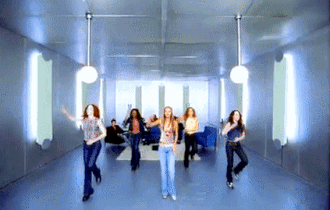Released: 19th February 2001
Writers: Hallgeir Rustan / Mikkel S.E. / Tor Erik Hermansen
Peak position: #3
Chart run: 3-7-7-9-14-17-23-25-35-46-62-65-60-53-57
Samantha Mumba’s music career was criminally short, but amidst her six-single oeuvre lies a pop conundrum so great that it will forever continue to divide families and friendships: which is better? Gotta Tell You or Always Come Back To Your Love? Both, it turns out, have ardent fans who staunchly argue their favourite as objectively the better song.

Our position has always remained largely unchanged: Always Come Back To Your Love is quite simply one of the best pop songs of the ’00s. Helmed by Stargate, the track is more or less an aural portfolio of every ‘00s production gimmick available to an aspiring pop star – and just so happens to meld them all into a euphoric four-minute track.

This is a song where the phrase “less is more” was clearly not applicable, with its copious layers of production. It’s hard to know where to start, but let’s talk vocals first and foremost. Putting the main vocal track to one side, there’s almost another song’s worth of additional content spoken throughout the track by D-Flex on the rap version. Nowadays, the definition of “rap” is altogether different, but what this meant by pop standards in 2001 was someone parroting the main lyrics and muttering “uh”, “what what” and “yes yes y’all” in the background. Samantha Mumba even gets in on the act, occasionally offering a “yeah, check it” and namechecking Stargate – all via another staple production quirk of the time: the muffled vocal that sounded like it was being phoned in – literally down a telephone line.
Show me where I belong tonight
Give me a reason to stay
No matter if I go left or right
I always come back to your love
Always Come Back To Your Love also has some really cute lyrics – particularly in the sense that it reduces the theme of a prodigal relationship to one based quite literally on simple directional movements: “I’ve been up and down, been going round and round” / “No matter if I go left or right, I always come back to your love”. Is it deep? No. Is it meaningful? No. But in the ‘00s pop paradigm, it makes perfect sense.

The instrumental track features a brooding bassline with a jangly piano melody sprinkled on top; the two together give the song an epic feel with a necessary depth to the production. Any less and the end result would sound a bit tinny and naff, but under Stargate’s watchful ear Always Come Back To Your Love boasts a confidence that belies only the biggest pop songs – and so it should. And if that wasn’t already enough, there’s a whopping great key-change included for good measure; it was one of our earliest gay comas – and it’s still a moment of pop euphoria as the track pounds into its final choruses.

Although Gotta Tell You was the song talked up as being on a par with Britney Spears, visually Always Come Back To Your Love is the track that bears much more resemblance to Samantha Mumba’s American pop peers. With stylised sets (a giant strip light ladder in the middle of a car park – why not?), carefully coordinated dance routines (albeit ones with energy levels comparable to 2011 Britney, rather than 2001) and a sumptuously fluffy rug, the video serves its purpose in showcasing the track as a prime cut of pop music. Samantha Mumba may not have been launched with the same budget and producers as her contemporaries, but you wouldn’t have known it from the way the project was presented, and it really pays off here. It’s thus somewhat odd that there isn’t a high-quality version of the video available on YouTube. Instead, what’s there is something that appears to have been recorded from the television with an iPhone 3.

Always Come Back To Your Love peaked at #3 in the UK. Indeed, such was the song’s popularity that it went on to become Samantha Mumba’s biggest selling single. Yet, despite pop fans lapping up the song with delight, Samantha herself didn’t seem to be having such a great time. Her TOTP performance is very much a “will this do” affair; even without the bum note, she looks thoroughly disinterested (or, something more important was happening on the ceiling tiles). Maybe it was a bad day at the office, but it’s just so hard to imagine anyone performing this on stage and it not being the greatest moment of their life.

Having casually released one of the best pop songs of the ‘00s at the start of 2001, the rest of the year was a busy one for Samantha Mumba. Amidst chart hits in America and bagging a starring role in the surefire movie hit The Time Machine, surely the pinnacle of the year was co-headlining a tour with Aaron Carter. Yes, Samantha Mumba had truly arrived, and it appeared she was here to stay…



